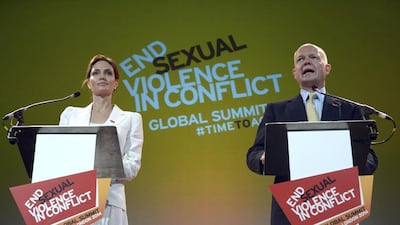LONDON // Actress and United Nations envoy Angelina Jolie and British Foreign Secretary William Hague on Tuesday opened a four-day international summit to focus attention on rape of women in war zones and conflict areas.
The summit, to be attended by more than 100 countries, aims to identify ways to better investigate and prosecute cases of sexual violence and provide support for women and girls.
Mr Hague called rape in war zones one of the “great mass crimes” of the last two centuries.
Ms Jolie said she wanted to dedicate the conference to a rape victim she and Mr Hague recently interviewed in Bosnia, who told them she felt so humiliated by what had happened to her she couldn’t tell her child about it.
“She felt that having had no justice for her particular crime, in her particular situation, and having seen the actual man who raped her on the streets free, she really felt abandoned by the world,” Ms Jolie said. “This day is for her.”
Ms Jolie, who has travelled extensively as a UN envoy dealing with refugee crises, said she has met with survivors in Afghanistan, Somalia and other conflict zones who have no place to turn for help.
“They live in refugee camps, on bombed-out streets, in areas where there is no law, no protection, and not even the hope of justice,” she said.
Mr Hague and Ms Jolie are scheduled to launch an international protocol Wednesday to help strengthen prosecutions for rape in conflicts.
On Thursday, Mr Hague will host a meeting focusing on the Islamist terrorist group Boko Haram, which will be attended by foreign ministers from Nigeria and neighbouring African countries.
The group’s abduction of more than 300 schoolgirls in Nigeria in April has put attention on the issue of violence against women in conflict areas.
* Associated Press

